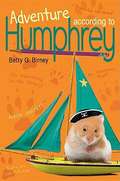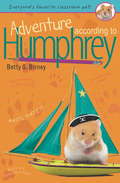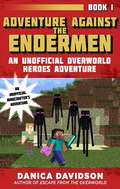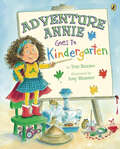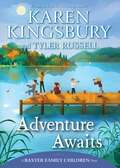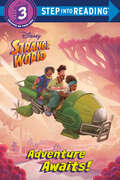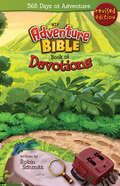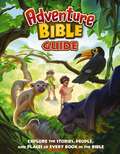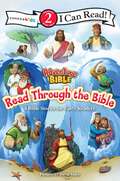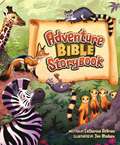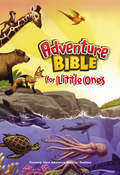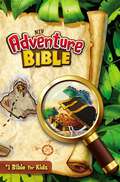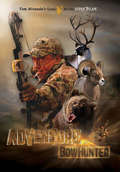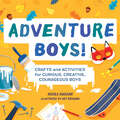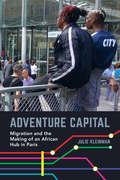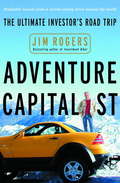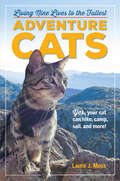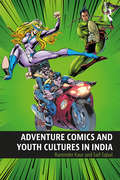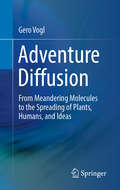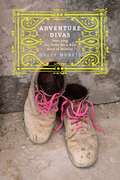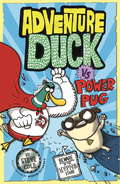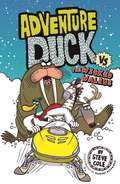- Table View
- List View
Adventure According to Humphrey (According to Humphrey #5)
by Betty G. BirneyHumphrey is in for his biggest adventure yet! <P><P>When his friends begin studying the ocean and sailing, he not only discovers the new and exciting world of the library, but also stows away aboard a model boat and takes a very perilous sail on Potter's Pond. <P><P>Even with all this excitement, he finds time to smooth rough waters between Gail and her free-spirited mom, help competitive Kirk see that winning isn't everything, and investigate whether his pal Aldo is really planning to become a pirate and sail the high seas.
Adventure Against the Endermen: An Unofficial Overworld Heroes Adventure, Book One (Unofficial Overworld Heroes Adventure #1)
by Danica DavidsonAfter discovering a portal to Earth and battling the evil Herobrine and his army of vicious mobs, Steve and his friends are known throughout the Overworld as heroes. Stevie’s enjoying the attention—that is, until he tries to show off and instead falls down a mineshaft. At the bottom of the mineshaft, Stevie finds an Ender crystal with mysterious powers. Soon the Overworld is in danger once again, this time from vicious Endermen! Mayor Alexandra summons Stevie, Alex, Maison, Yancy, and Destiny to try and stop the attacks. When the friends investigate, they quickly realize that the Endermen are looking for something. Could it be Stevie’s Ender crystal? Soon the group of friends—now an Overworld task force—are caught up in a battle larger than any they could have imagined. Can they protect the world of Minecraft from Endermen—and the larger threat of the crystal?Fans of Minecraft will race to the end of this first installment in the Unofficial Overworld Heroes Adventure series by Danica Davidson!
Adventure Annie Goes to Kindergarten
by Toni BuzzeoFrom the author of the 2013 Caldecott Honor Book, ONE COOL FRIEND!Annie Grace wears her "Adventure Annie" cape to her first day of kindergarten, and proceeds to barrel through the day, searching for adventure in every moment. Her interpretation of the class's Gold Star Rules isn't exactly what her teacher, Mr. Todd, had in mind. But somehow Annie does manage to save the day when two of her classmates get lost on their way to retrieve the afternoon snack. Spirited and funny, this is an introduction to kindergarten that will please kids and teachers alike.
Adventure Awaits (A Baxter Family Children Story)
by Karen Kingsbury Tyler RussellIn the fourth book in Karen Kingsbury&’s and Tyler Russell&’s beloved series about the Baxter children, Kari and Ashley go through the ups and downs of summer camp.School science camp is a few weeks away, but Ashley and Kari Baxter have very different feelings about going. With the help of their siblings, Kari and Ashley prepare for wild experiments and the challenges of the great outdoors, and together they learn what it means to plan for an experience they won&’t forget. In the process, all five Baxter Children learn how to make new friends and that adventure awaits in the everyday. They just have to look for it!
Adventure Awaits! (Step into Reading)
by RH DisneyThis Step 3 Step into Reading leveled reader is based on the Disney film Strange World—in theaters on November 23, 2022!Walt Disney Animation Studios&’ Strange World journeys deep into an uncharted and treacherous land where fantastical creatures await. Directed by Don Hall, written by Qui Nguyen, and produced by Roy Conli, Strange World arrives in theaters on November 23, 2022. Children ages 6 to 8 will love this Step 3 Step into Reading leveled reader based on the animated feature film. Step 3 readers feature engaging characters in easy-to-follow plots about popular topics. They are for children who are ready to read on their own.
Adventure Bible Book of Devotions, NIV
by Robin Schmitt<P>Grab your spyglass and compass and set sail for adventure! <P>Like a map that leads to great treasure, this revised edition of the NIV Adventure Bible Book of Devotions takes kids on a thrilling, enriching quest.<P> This yearlong devotional is filled with exciting fictional stories about kids finding adventure in the real world.<P> Boys and girls will learn more about God and the Bible, and be inspired to live a life of faith—the greatest adventure of all.<P>Companion to the Adventure Bible, the #1 bestselling Bible for kids.
Adventure Bible Guide: Explore the Stories, People, and Places of Every Book in the Bible (Adventure Bible)
by ZondervanExplore the Bible like never before! This companion to the bestselling Adventure Bible gives young readers the key details of every book of the Bible at their fingertips. With kid-friendly overviews of Genesis through Revelation and full-color infographics, maps, and images, children will strengthen their faith and gain a deeper understanding of the most important story ever told.The Adventure Bible Guide takes readers 8–12 on a fun-filled, informative journey toward truly understanding God&’s Word. This immersive reference guide gives clear, crisp insights into the Bible book by book, including:key details and events that are clearly laid out, in words kids can easily understandcolorful infographics that include historical information, significant events and details, and important biblical characterscallouts with fun facts and key takeawaysmaps that help readers understand where each part of the Bible occurredimages of artifacts and important places that help bring the Bible to lifeThis book is made to be used alongside the Bible to help readers better comprehend the context and background of God&’s Word, condensing the most important information in a highly visual, easy-to-understand format, which in turn helps kids connect with the Bible text in new and deeper ways.The Adventure Bible Guide is:perfect for kids 8–12 learning to explore the Bible on their owna great resource for teachers, parents, and homeschoolers to use to engage students in the Bible and biblical historypart of the wider Adventure Bible line, which includes NIV Adventure Bible, Adventure Bible Book of Devotions,?and The Adventure Bible Book of Daring Deeds and Epic Creations
Adventure Bible Read Through the Bible: 8 Bible Stories for Early Readers (Level 2 I Can Read) (Adventure Bible)
by ZondervanPractice important reading skills while reading eight favorite Bible stories in the Adventure Bible Read Through the Bible. Combining the beloved Adventure Bible with the proven I Can Read format, this Level 2 I Can Read collection combines engaging stories, longer sentences, and beautiful illustrations, perfect for building confidence and developing reading skills. Adventure Bible Read Through the Bible:Is ideal for readers ages 4 and up who are reading with helpTeaches Bible stories in an accessible format while growing critical reading skillsIs perfect for back to school, summer reading, homeschool, and Sunday school classroomsComes in hardcover format for longer lasting durability and is value-priced at $16.99Is part of the Adventure Bible brand, recommended by more schools and churches than any other Bible for kids, and has impacted more than 10 million families to date. Adventure Bible Read Through the Bible features 8 beloved Bible stories:God&’s Great CreationNoah&’s VoyageMoses Leads the PeopleJoseph the DreamerRuth and NaomiBrave Queen EstherMiracles of JesusPaul Meets Jesus
Adventure Bible Storybook: An Interactive Adventure Through God's Redemptive Story (Adventure Bible)
by Catherine DevriesThe newest edition to the top-selling Adventure series, this storybook Bible for kids ages 4-7 will start them on a journey of discovering about the Bible and growing with God as they grow up with the Adventure Bible, at every age and stage, beginning with the Bible Storybook and continuing on through age 12 with the NIV edition. At every twist and turn, the Adventure Bible Storybook is filled with—what else—ADVENTURE! Parents and loved ones can be assured that children who read it will learn the main stories and themes from the Bible, but all within a fun, exciting theme of discovering, imagination, and suspense—everything you’d expect from a fantastic adventure. This storybook includes some lesser known stories that are particularly adventurous, such as Paul’s shipwreck on the island of Malta, and when the Israelites went to spy on the people of Canaan. The Adventure Bible Storybook was the 2009 Retailers Choice Award winner in the Children’s Nonfiction category.
Adventure Bible for Little Ones (Adventure Bible)
by Catherine DeVriesThe Adventure Bible for Toddlers starts children ages 2-5 on the journey of a lifetime, teaching them about the Bible&’s great stories and themes. It helps young children grow in their relationship with God using stories and art from the wildly popular Adventure Bible Storybook. With ten beautifully illustrated and beloved Bible stories from the Old and New Testament, this book will stimulate toddlers&’ minds and fill their hearts with love for their heavenly Father.
Adventure Bible, NIV (Adventure Bible)
by Lawrence O. RichardsReady for Adventure? Embark on a fun, exciting journey through God’s Word with the 2013 NIV Adventure Bible. Along the way you’ll meet all types of people, see all sorts of places, and learn all kinds of things about the Bible. Most importantly you’ll grow closer in your relationship with God. Recommended by more Christian schools and churches than any other Bible for kids. Features include: new timelines added to the book intros; new additions to the “People in Bible Times;” new additions to the “Life in Bible Times;” Bible book names appear on page edges to help the reader locate verses; full color; increased content in book introductions; revised tip ins; and QR codes link to additional content online.
Adventure Bowhunter: Tom Miranda's Quest for the Super Slam of North American Big Game
by Tom MirandaJoin adventure bowhunter Tom Miranda as he travels throughout North America in pursuit of the archery Super Slam - all 29 of the continent's big-game animals. Considered the Everest of bowhunting, the Super Slam stands as the pinnacle of archery hunting achievements. Follow Miranda through 13 years and 54 hunts as he chases the incredible Super Slam.
Adventure Boys!: Crafts and Activities for Curious, Creative, Courageous Boys (Adventure Crafts for Kids)
by Nicole DugganActivities that foster creativity, curiosity, and courage in boys ages 6 to 12 Discover exciting new kinds of crafts for kids. Whether your boy adventurer likes to play outside, work with his hands, get creative, or do all three at once—Adventure Boys! has all kinds of awesome ways for him to play. Empower boys and encourage them to try new things. Whether it's creating a backyard racetrack, developing coding skills, or building a neighborhood book exchange, this standout among books of crafts for kids will teach them just how amazing they can be. Go beyond other activity books for kids with: Outdoor skills—Boys will have a blast getting outside as they try activities like building a tree house or growing plants. Handy crafts—This collection of crafts for kids encourages constructive play by showing them how to create everything from air-powered race cars to musical instruments. Creative activities—Inspire creative thinking in boys as they learn how to create stop-motion videos, dye their own clothes, and more. Help boys discover the excitement of trying new things with these super fun crafts for kids.
Adventure Capital: Migration and the Making of an African Hub in Paris
by Julie KleinmanParis’s Gare du Nord is one of the busiest international transit centers in the world. In the past three decades, it has become an important hub for West African migrants—self-fashioned adventurers—navigating life in the city. In this groundbreaking work, Julie Kleinman chronicles how West Africans use the Gare du Nord to create economic opportunities, confront police harassment, and forge connections to people outside of their communities. Drawing on ten years of ethnographic research, including an internship at the French national railway company, Kleinman reveals how racial inequality is ingrained in the order of Parisian public space. She vividly describes the extraordinary ways that African migrants retool French transit infrastructure to build alternative pathways toward social and economic integration where state institutions have failed. In doing so, these adventurers defy boundaries—between migrant and citizen, center and periphery, neighbor and stranger—that have shaped urban planning and immigration policy. Adventure Capital offers a new understanding of contemporary migration and belonging, capturing the central role that West African migrants play in revitalizing French urban life.
Adventure Capitalist: The Ultimate Investor's Road Trip
by Jim RogersBehind the wheel of a sunburst-yellow, custom-built Mercedes, Rogers and his fiancee, began their Adventure They drove through 116 countries, through war zones, deserts, jungles, and blizzards.
Adventure Capitalist: The Ultimate Road Trip
by Jim RogersDrive . . . and grow rich!The bestselling author of Investment Biker is back from the ultimate road trip: a three-year drive around the world that would ultimately set the Guinness record for the longest continuous car journey. In Adventure Capitalist, legendary investor Jim Rogers, dubbed "the Indiana Jones of finance" by Time magazine, proves that the best way to profit from the global situation is to see the world mile by mile. "While I have never patronized a prostitute," he writes, "I know that one can learn more about a country from speaking to the madam of a brothel or a black marketeer than from meeting a foreign minister."Behind the wheel of a sunburst-yellow, custom-built convertible Mercedes, Rogers and his fiancée, Paige Parker, began their "Millennium Adventure" on January 1, 1999, from Iceland. They traveled through 116 countries, including many where most have rarely ventured, such as Saudi Arabia, Myanmar, Angola, Sudan, Congo, Colombia, and East Timor. They drove through war zones, deserts, jungles, epidemics, and blizzards. They had many narrow escapes.They camped with nomads and camels in the western Sahara. They ate silkworms, iguanas, snakes, termites, guinea pigs, porcupines, crocodiles, and grasshoppers.Best of all, they saw the real world from the ground up--the only vantage point from which it can be truly understood--economically, politically, and socially.Here are just a few of the author's conclusions: * The new commodity bull market has started.* The twenty-first century will belong to China.* There is a dramatic shortage of women developing in Asia.* Pakistan is on the verge of disintegrating.* India, like many other large nations, will break into several countries.* The Euro is doomed to fail.* There are fortunes to be made in Angola.* Nongovernmental organizations (NGOs) are a scam.* Bolivia is a comer after decades of instability, thanks to gigantic amounts of natural gas.Adventure Capitalist is the most opinionated, sprawling, adventurous journey you're likely to take within the pages of a book--the perfect read for armchair adventurers, global investors, car enthusiasts, and anyone interested in seeing the world and understanding it as it really is.
Adventure Carolinas
by Joe MillerHave you ever wanted to take up a new outdoor sport but thought, "Not me" or "Where do I begin"? In this unique take-it-with-you guide, outdoors and fitness writer Joe Miller introduces you to sixteen adventure sports in the Carolinas, from water to land and through all four seasons. No matter where you live or what your level of expertise may be, he will lead you to opportunities that range from beginner level to peak experience and equip you with the tools and courage to get outdoors and enjoy nature in new and exciting ways. For each experience, Miller includes location, how to start, associated costs, organizations that can help you begin, physical and mental demands of each activity, and whether the activities are seasonal or competitive.Activities include mountain biking, flat-water and whitewater paddling, scuba diving, climbing, backcountry exploration, skiing, snowboarding and tubing, kiteboarding, hang gliding, and ziplining.
Adventure Cats: Living Nine Lives to the Fullest
by Laura J. MossJust when you thought you knew all there was to know about cats comes the ultimate—and unexpected—guide to taking your cat into the wild. Here are cats walking on a leash. Cats hiking on a leash. Cats tramping through snow. Cats camping. Cats kayaking, canoeing, even surfing—yes, cats who love water. When animal writer and active hiker Laura Moss couldn’t find an online resource for hitting the trail with her cat, she created one. AdventureCats.org took off like wildfire, with attention from Wired, the Huffington Post, Outside magazine, BuzzFeed, and much more. Now, the book Adventure Cats—a collection of jaw-dropping photographs, inspiring stories of real-life cats, and all the how-to a cat owner needs—will take readers and their cats well beyond the backyard. Learn how to leash-train a cat. What to do if you encounter wildlife on the trail. Plus, winter safety tips, and how to bring a little bit of the outdoors to an indoor cat. The stories themselves are catnip for animal lovers, from Nanakuli, the one-eyed cat who hangs ten; to Georgie, a four-year-old gray tabby who lives on a sailboat; to Quandary, who not only insists on hiking with her family but also teaches them a valuable lesson: When you follow your cat’s natural tendency to wander, you experience the outdoors at a slower, richer pace. This book will delight every cat person, regardless of whether their pet is inclined to adventure. (Take the quiz at the beginning of the book to find out!)
Adventure Comics and Youth Cultures in India
by Raminder Kaur Saif EqbalThis pioneering book presents a history and ethnography of adventure comic books for young people in India with a particular focus on vernacular superheroism. It chronicles popular and youth culture in the subcontinent from the mid-twentieth century to the contemporary era dominated by creative audio-video-digital outlets. The authors highlight early precedents in adventures set by the avuncular detective Chacha Chaudhary with his ‘faster than a computer brain’, the forays of the film veteran Amitabh Bachchan’s superheroic alter ego called Supremo, the Protectors of Earth and Mankind (P.O.E.M.), along with the exploits of key comic book characters, such as Nagraj, Super Commando Dhruv, Parmanu, Doga, Shakti and Chandika. The book considers how pulp literature, western comics, television programmes, technological developments and major space ventures sparked a thirst for extraterrestrial action and how these laid the grounds for vernacular ventures in the Indian superhero comics genre. It contains descriptions, textual and contextual analyses, excerpts of interviews with comic book creators, producers, retailers and distributers, together with the views, dreams and fantasies of young readers of adventure comics. These narratives touch upon special powers, super-intelligence, phenomenal technologies, justice, vengeance, geopolitics, romance, sex and the amazing potentials of masked identities enabled by navigation of the internet. With its lucid style and rich illustrations, this book will be essential reading for scholars and researchers of popular and visual cultures, comics studies, literature, media and cultural studies, social anthropology and sociology, and South Asian studies.
Adventure Diffusion: From Meandering Molecules to the Spreading of Plants, Humans, and Ideas
by Gero VoglThis easy-to read book looks at the many ways in which diffusion bears on processes that involve dispersion, starting from the Brownian motion of molecules, covering the invasion of exotic plants, migration of populations, epidemics, and extending to the spreading of languages and ideas. Recently, there has been a growing interest in understanding migrations, diffusion and spreading outside the “hard” natural sciences of physics and chemistry, for example the spreading of plants introduced as a result of globalization. Another fascinating story is that of human migration in the distant past, i.e. the immigration of our ancestors who brought agriculture from the Near East, or the fast spread of the Palaeo-Indians into the Americas after the end of the Ice Age. Likewise, the spread of languages in the past, and even more so the current spread and retreat of languages will be described here in terms of diffusion. By understanding these principles, there is hope that some of the less common languages that are threatened by globalization can be saved. Another important implication discussed by the author concerns the outbreak of epidemics; these may be mitigated if we understand their spreading mechanism. Last but not least the spreading of ideas and innovations, a process which changes the world sometimes faster than we wish, can also be usefully described in this picture.
Adventure Divas: Searching the Globe for Women Who Are Changing the World
by Holly MorrisAfter years of working behind a desk, Holly Morris had finally had enough. So she quit her job and set out to prove that adventure is not just a vacation style but a philosophy of living and to find like-minded, risk-taking women around the globe. With modest backing, a small television crew, her spirited producer-mother, Jeannie, and a whole lot of chutzpah, Morris tracked down artists, activists, and politicos-women of action who are changing the rules and sometimes the world around them. In these pages, Morris brings to life the remarkable people and places she's encountered on the road while filming her PBS series Adventure Divas and other programs. We meet Assata Shakur, a former Black Panther and social activist and now a fugitive living in exile in Cuba; Kiran Bedi, New Delhi's chief of police, who revolutionized India's infamously brutal Tijar Jail with her humanitarian ethic; New Zealand pop star Hinewehi Mohi, a Maori who reinvigorates her native culture for a new generation; and Mokarrameh Ghanbari, a septuagenarian painter and rice farmer who lives in the tiny village of Darikandeh on the Caspian plains of Iran, where her creative talents run counter to the government's strict stance on art. Along the way, Morris herself becomes a certified Adventure Diva, as she hunts for wild boar with Penan tribesmen in the jungles of Borneo, climbs the Matterhorn short-roped to a salty fourth-generation Swiss guide, and memorably becomes the first woman ever to enter the traditional camel race of the Saharan oasis town of Timia. Intelligent, phenomenally funny, and chock-full of rich and telling details of place, Adventure Divas is a pro-woman chronicle for the twenty-first century. In a pilgrimage fueled by curiosity, ideology, and full-on estrogen power, Holly Morris has paved the way for all of us to discover our own diva within and set out on our own adventures.
Adventure Dogs: Activities to Share with Your Dog - from Comfy Couches to Mountain Tops
by Fern WattLet your dog lead the way to adventure!Grab your four-legged best friend and start making the most of every day, and every dog year. In Adventure Dogs: Activities to Share with Your Dog—from Comfy Couches to Mountain Tops, author Fern Watt teams up with canine experts to offer more than 50 surprising new ways to strengthen the connection you share with your dog. Captured in vibrant, full-color photography, activities range from simple to epic. What would make your dog's "bucket list" of must-see and -do adventures? Find out together as you uncover your pup's special interests and skills using this adventure book.Follow your pup into a world of herding, sniffing, playing, howling, and walking! From hiking a mountain or taking a smell walk in your own neighborhood to training like a Navy SEAL or practicing "doga" poses, Adventure Dogs has an activity or experience for every breed, personality, energy level, age, and dog parent. Our Dogs remind us that great adventures don't always require a passport—there are tons of wonders right outside our front doors.Perfect for dog lovers, armchair travelers, and active pet parents alike, Adventure Dogs reveals inspirational and practical ways for us humans to understand, appreciate, and live in the moment with our furry companions.• PRACTICAL ADVENTURES: Features more than 50 real, everyday activities to engage with your dog in scientifically-backed ways. With a range of prices, activity levels, and time investments, there's something in this animal activity book for everyone and every pup.• BACKED BY RESEARCH: Author Fern Watt traveled and did her own research with her rescue dog, Bette. She's also consulted renowned scientists and behaviorists (Alexandra Horowitz), bestselling dog-book authors (Seth Casteel), Instagram-famous dog owners (@tunameltsmyheart), and people who have expanded the limits of what we thought dogs could do, whether it's surf, skateboard, paint, do yoga, run for mayor, or graduate from an Ivy League school.• INSPIRATIONAL LOCATIONS: Features pet-friendly destinations (hotels, beaches, dog parks, hikes, and more!) around the United States and abroad.• OVERFLOWING WITH IDEAS: Watt consults a range of experts to add stories, tips, and photography to the book. The result is a vibrant collection of voices and perspectives.
Adventure Duck vs Power Pug: Book 1 (Adventure Duck)
by Steve ColeThere's no ducking out - it's time for this ordinary, wise-quacking duck to become . . . A Hero!Adventure Duck didn't ask for greatness. All he wanted was his nest on the duckpond and plenty of soggy bread to eat. But when a meteor gives him superpowers, he knows he must fly into battle and defeat the forces of evil.Every superhero needs a nemesis, and Adventure Duck finds a pint-sized one in Power Pug. This tiny arch-villain is plotting to take over the world with his hypnotic stare and an army of hench-animals. Luckily, Adventure Duck has helpers, too. There's Yoki - a mystical, moustachioed egg - and Neon Zebra, Adventure Duck's karate-kicking sidekick.Can Adventure Duck and his friends stop Power Pug in this egg-ceptionally funny, action-packed adventure?
Adventure Duck vs The Wicked Walrus: Book 3 (Adventure Duck)
by Steve ColeThere's no ducking out - the space race is on and Adventure Duck must defeat his new nemesis, the Wicked Walrus!Adventure Duck fluffs up his feathers and heads to the North Pole, where his ice-hearted enemy, Power Pug, has set up a secret space base. The pug's latest hench-animal, a super-smart walrus, is building a rocket to blast his master to Mars. But if it launches, the whole Artic will be wiped out! Can Adventure Duck and his new friend - an (occasionally) invisible reindeer - stop Power Pug from expanding his evil empire in outer space?
